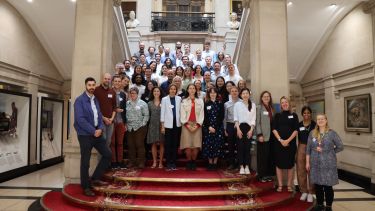Our Circular Economy Symposium was a really exciting opportunity to bring together leading research and practice to progress a circular built environment. We had a range of inspiring speakers, fantastic posters and really fruitful discussions across the day, with around 70 attendees from across Europe. I was delighted with the enthusiasm to work together and create a more circular built environment.
Dr Danielle Densley Tingley
Senior Lecturer and Director of the Urban Flows Observatory
Staff and PhD Researchers from the Department of Civil and Structural Engineering at the University of Sheffield organised the University’s first built environment focused“Circular Economy Symposium” on Friday 30th June 2023 at the Institution of Structural Engineers (ICE) in London. The event was funded as part of Dr Densley Tingley’s EPSRC Project exploring the circular economy potential of the UK’s building stock.
The theme of the symposium was "towards a circular built environment: bridging the gap between research and practice", reflecting the need for an open, continuous conversation between academia and industry, as well as across the construction supply chain, in order to accelerate the circularity of material use within the built environment.
A day in reflection
The day consisted of a series of keynote speeches from across academia and industry, including on "The role of material stocks for a sustainable circular economy" (Dominik Wiedenhofer, University of Natural Resources and Life Sciences, Austria), "Material Passports in practice" (Melanie Martin, Orms) and "A bridge between industry and academia" (Andrea Charlson, Useful Simple Trust). The first two set the scene and provided context and data comparisons between the EU and the UK, as well as details of live case studies implementing circular principles. The final keynote provided reflection on some example links between industry and academia, with a call to action for further collaboration.
The remainder of the day was aligned with these topics and the overall theme, with 11 further presentations being spread across four sessions on: urban mining, reuse, material reprocessing and design drivers for a circular economy.
Throughout the day, there was also opportunity for participants to present their work in an open poster session, with the award for best poster (as voted by attendees) going to Alperen Yayla from Imperial College London for their work on “Global Wood Cycle”. Laura Batty (Heyne Tillett Steel) took the corresponding award for best presentation, for her talk on the 'HTS Stockmatcher' for secondary steel reuse.
The day was brought to a close by a forward-looking panel discussion between Andrea Charlson (Useful Simple Trust), Charles Gillott (The University of Sheffield), Maud Lanau (Chalmers University of Technology) and David Cheshire (Aecom). The panellists explored progress in research and practice to date, as well as necessary next steps for academia and industry to work together in accelerating the transition to a circular economy within the built environment. Key conclusions included the need for longstanding collaborative relationships and standardised and transparent data collection and sharing between both academia and industry.
It was inspiring to hear the progress being made in both the research community and industry on enhancing the circularity of the built environment, from practical innovations in materials reuse and recycling to systematic enablers such as materials passports and policy mechanisms. I hope we can continue creating the fora for these kinds of knowledge exchange and facilitating the conversations that emerge
Andrea Charlson
Associate Director, Useful Projects
Hopes for the future
The majority of Urban Flows Observatory projects are industry-focussed and include cross-sector collaboration, and the 2023 symposium successfully formalised this in a conference-style event. The day reiterated the need for strong industry-academia links, and was a great first step in bringing together a wide range of researchers from across Europe with UK focused industrial practitioners to forge connections in an open and collaborative format.
In the future, the Urban Flows Observatory hopes to hold similar (bi-)annual circular built environment symposium events, and are currently exploring potential themes and suitable locations to maximise involvement from both research and industry communities. If you would be interested in partnering, hosting, attending, or sponsoring a future Urban Flows Observatory event, please contact regenerate@sheffield.ac.uk.
[The event] provided an exciting day full of the latest insights about the potentials and limits for a more circular economy in the built environment, bringing research and practice together in a highly useful format for mutual learning.
Dominik Wiedenhofer
Senior Scientist at the Institute of Social Ecology Vienna (SEC), University of Natural Resources and Life Sciences
About the Urban Flows Observatory
The Urban Flows Observatory seeks to enable a built environment in which humanity thrives within the carrying capacity of the planet. As well as other related areas (e.g. air quality, resilient infrastructure and urban form) the observatory investigates the flow of materials within the built environment, in order to better understand - and ultimately accelerate - the transition to a circular economy (CE). This sees consideration of a range of different CE strategies, including the retention, reuse, and recycling of buildings, components and materials, and the design of new buildings to maximise this in the future.
You can learn more about the Symposium and find a detailed agenda for the event here: https://urbanflows.ac.uk/ce-symposium-2023/

